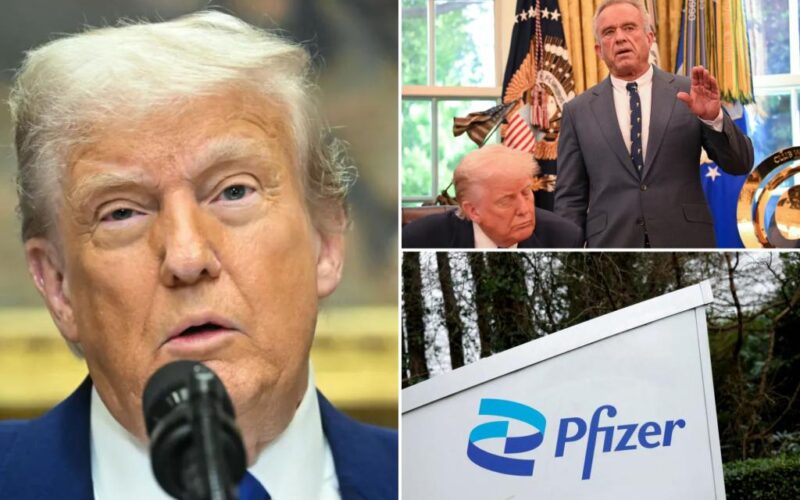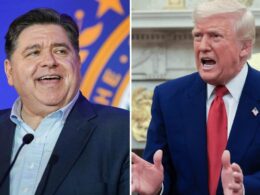President Trump signed an executive order Monday meant to slash Americans’ pharmaceutical costs by up to 90% by tying the price paid by government programs like Medicare to the rates drug companies charge overseas customers.
“What’s been happening is, we’ve been subsidizing other countries throughout the world,” Trump explained at a White House signing ceremony, calling Monday’s action one of his “most important orders.”
“Some prescription drug and pharmaceutical prices will be reduced almost immediately by 50 to 80 to 90%, he added. “Big Pharma will either abide by this principle voluntarily or we’ll use the power of the federal government to ensure that we are paying the same price.”
The policy is a revival of Trump’s signature “most favored nation” drive from his first term, with a new push to get foreign countries to take on more of the research and development (R&D) costs that experts say America has disproportionately shouldered.
“Our Country will finally be treated fairly, and our citizens Healthcare Costs will be reduced by numbers never even thought of before,” the president previously promised on Truth Social Sunday. “The United States will save TRILLIONS OF DOLLARS.”
The order directs US Trade Representative Jamieson Greer and Commerce Secretary Howard Lutnick to “take all appropriate action against unreasonable and discriminatory policies in foreign countries that suppress drug prices abroad,” White House officials said.
After 30 days, Health and Human Services Secretary Robert F. Kennedy Jr. will “set clear targets for price reductions across all markets” in the US and open a “round of negotiations” with industry.
Some experts have argued that foreign countries “freeload” off the US by artificially suppressing drug prices in their countries, leading pharmaceutical companies to jack up costs for Americans to pay for R&D.
“The United States has less than 5% of the world’s population, but accounts for roughly three-quarters of global pharmaceutical profits. The President has made clear that this status quo is unacceptable,” a White House official told reporters ahead of the order signing.
“Basically, what we’re doing is equalizing” drug prices between the US and other countries, Trump claimed adding that “American patients were effectively subsidizing socialist healthcare systems in Germany, in all parts of the European Union.”
In contrast to Trump’s first administration, which pursued “most favored nation” status to boost the negotiating position of Medicare Part B, the order signed Monday will be much broader in scope, according to White House officials.
“We don’t anticipate a negative impact on innovation,” a White House official told The Post, responding to the most common critical complaint. “The United States alone should not be paying for all of the innovation in the entire world in this market.”
The Justice Department and Federal Trade Commission will also be tasked with enforcing anti-competitive practices against companies to push their prices down.
Additionally, the Food and Drug Administration will look to expand imported drugs beyond Canada to other countries in a bid to pressure prices down.
In doing so, the administration is hoping to undercut pharmaceutical companies’ ability to charge lower prices overseas than in the US.
“Special interests may not like this very much, but the American people will,” Trump said of the executive order. “I am doing this for the American people. I’m doing this against the most powerful lobby in the world, probably — the drug lobby.”
White House officials rejected characterizations of the policy as a version of price control.
“In the global market, you have a situation where Americans are paying several times the price for the same exact drug, even the same manufacturing facility and whatnot, that our peers and other countries are paying,” an official told reporters.
“This isn’t price fixing per se. But what we’re doing here is kind of initializing market forces to operate the way they’re supposed to.”
Kennedy lauded Trump’s executive order, saying he “never thought that this would happen in my lifetime” and said the policy was the “fulcrum of Bernie Sanders’ runs for presidency [in 2016 and 2020].”
Former President Joe Biden had nixed Trump’s “most favored nation” policy from his first term. Trump chided that his predecessor did so “without any knowledge of what he was doing” and ripped the new drug pricing system that Biden pursued under the Inflation Reduction Act.
Trump also pledged that his administration will take aim at the “middlemen” in drug prices, alluding to pharmacy benefit managers (PMB), which had drawn bipartisan criticism.
“We’re going to totally cut out the famous middlemen,” Trump said vaguely. “I’ve been hearing the term for 25 years. I don’t know who they are, but they’re rich, that I can tell you.”








